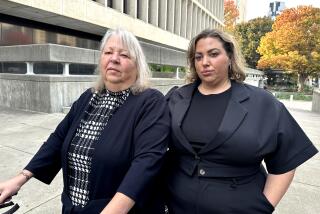Tenet Overcharged Latinos, Suit Alleges
A group of former patients is suing the nation’s second-biggest hospital chain, alleging that Tenet Healthcare Corp. overcharged poor and uninsured Latinos as part of a scheme to take advantage of a federally funded charity care program.
Seven lawsuits have been filed in various state courts in Southern California, each alleging that Tenet ran a two-tier billing scheme that greatly inflated the costs of medical procedures, most often involving Latinos. This was done, the lawsuits allege, to reap huge federal reimbursements through the Medicaid Disproportionate Share Hospital Payment Program.
“They are making their money on the backs of taxpayers and the poor,” said K.B. Forbes, a spokesman for the patients.
A Tenet spokesman was dismissive of the suits and referred to Forbes as a political operative with close ties to an Indianapolis medical insurance firm from which Tenet is trying to collect $2 million in unpaid medical bills.
“We believe we have been slimed by an orchestrated attack from sharp political operatives posing as activists for the poor and uninsured,” said the spokesman, Harry Anderson.
Forbes was a spokesman for conservative presidential hopeful Pat Buchanan.
The DSH program provides state and federal funds for what is commonly referred to as uncompensated or charity care, treatment for a patient who is uninsured and unable to pay.
The lawsuits accuse Tenet of refusing partial payments so as to qualify more cases as DSH eligible.
One plaintiff, Pasqual Rivera, said he first heard about his hospital bill through a Tenet collection agency. Rivera said he offered partial payments of $5,000 and $10,000 on a $28,604 bill, but they were turned down.
Tenet said it offered Rivera a 30% discount on his bill and suggested an installment plan.
Anderson said that, far from penalizing Latino patients, Tenet was the one Southern California hospital group expanding services in middle-to-low-income Latino communities.
The California Department of Health Services official who oversees the DSH program said that even if Tenet were greatly exaggerating the cost of its charity care--and he had no indication that it was--the effect would be minimal.
“They would not have been able to inflate their DSH funding in any significant way, if at all,” said Stan Rosenstein, an assistant deputy director for the agency.
More to Read
Sign up for Essential California
The most important California stories and recommendations in your inbox every morning.
You may occasionally receive promotional content from the Los Angeles Times.











